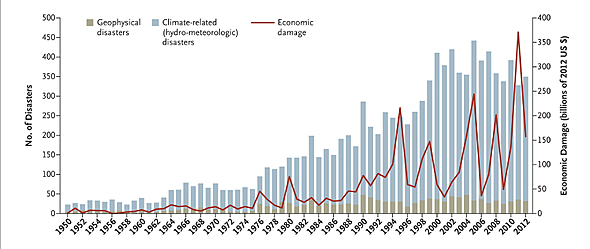RollingThunder
Gold Member
- Mar 22, 2010
- 4,818
- 522
- 155
Here's how carbon taxes work in real life. Really well.
British Columbia's carbon tax
The evidence mounts
The Economist
Jul 31st 2014,
UNTIL recently, British Columbians consumed as much fuel per head as their fellow Canadians. Nothing remarkable distinguished their use of fossil fuel until, in 2008, they began paying a carbon tax. Six years later the province remains the only jurisdiction in North America to levy a charge on fossil-fuel consumption.
BC’s levy started at C$10 ($9) a tonne in 2008 and rose by C$5 each year until it reached C$30 per tonne in 2012. That works out to 7 cents of the C$1.35 per litre Vancouver residents pay at the pump to fill up their vehicles. Because the tax must, by law in BC, be revenue-neutral, the province has cut income and corporate taxes to offset the revenue it gets from taxing carbon. BC now has the lowest personal income tax rate in Canada and one of the lowest corporate rates in North America, too.
BC’s fuel consumption is also down. Over the past six years, the per-person consumption of fuels has dropped by 16% (although declines levelled off after the last tax increase in 2012). During that same period, per-person consumption in the rest of Canada rose by 3%. “Each year the evidence becomes stronger and stronger that the carbon tax is driving environmental gains,” says Stewart Elgie, an economics professor at University of Ottawa and head of Sustainable Prosperity, a pro-green think-tank. At the same time, BC’s economy has kept pace with the rest of the country.

Some industries remain unconvinced by the tax. BC cement makers say they’ve lost a third of their market share to US and Asian imports. Farmers facing competition from non-carbon-taxed jurisdictions have wrestled back rebates from the government. But even without the rebates, a study released in July by the Pacific Institute for Climate Solutions (PICS), a research network, found that the agriculture sector didn’t suffer any downturn because of the tax.
Stephen Harper, the prime minister, remains unimpressed. In June, when fellow centre-right prime minister Tony Abbott of Australia arrived for a visit, the two leaders dismissed the carbon tax as an iffy hedge against climate change and a destroyer of jobs. But the BC experiment makes that line harder to sustain. “There’s very little evidence—zero evidence—that carbon taxing is related to jobs,” says Brandon Schaufele at the University of Western Ontario, who co-authored the PICS report.
British Columbia's carbon tax
The evidence mounts
The Economist
Jul 31st 2014,
UNTIL recently, British Columbians consumed as much fuel per head as their fellow Canadians. Nothing remarkable distinguished their use of fossil fuel until, in 2008, they began paying a carbon tax. Six years later the province remains the only jurisdiction in North America to levy a charge on fossil-fuel consumption.
BC’s levy started at C$10 ($9) a tonne in 2008 and rose by C$5 each year until it reached C$30 per tonne in 2012. That works out to 7 cents of the C$1.35 per litre Vancouver residents pay at the pump to fill up their vehicles. Because the tax must, by law in BC, be revenue-neutral, the province has cut income and corporate taxes to offset the revenue it gets from taxing carbon. BC now has the lowest personal income tax rate in Canada and one of the lowest corporate rates in North America, too.
BC’s fuel consumption is also down. Over the past six years, the per-person consumption of fuels has dropped by 16% (although declines levelled off after the last tax increase in 2012). During that same period, per-person consumption in the rest of Canada rose by 3%. “Each year the evidence becomes stronger and stronger that the carbon tax is driving environmental gains,” says Stewart Elgie, an economics professor at University of Ottawa and head of Sustainable Prosperity, a pro-green think-tank. At the same time, BC’s economy has kept pace with the rest of the country.

Some industries remain unconvinced by the tax. BC cement makers say they’ve lost a third of their market share to US and Asian imports. Farmers facing competition from non-carbon-taxed jurisdictions have wrestled back rebates from the government. But even without the rebates, a study released in July by the Pacific Institute for Climate Solutions (PICS), a research network, found that the agriculture sector didn’t suffer any downturn because of the tax.
Stephen Harper, the prime minister, remains unimpressed. In June, when fellow centre-right prime minister Tony Abbott of Australia arrived for a visit, the two leaders dismissed the carbon tax as an iffy hedge against climate change and a destroyer of jobs. But the BC experiment makes that line harder to sustain. “There’s very little evidence—zero evidence—that carbon taxing is related to jobs,” says Brandon Schaufele at the University of Western Ontario, who co-authored the PICS report.





